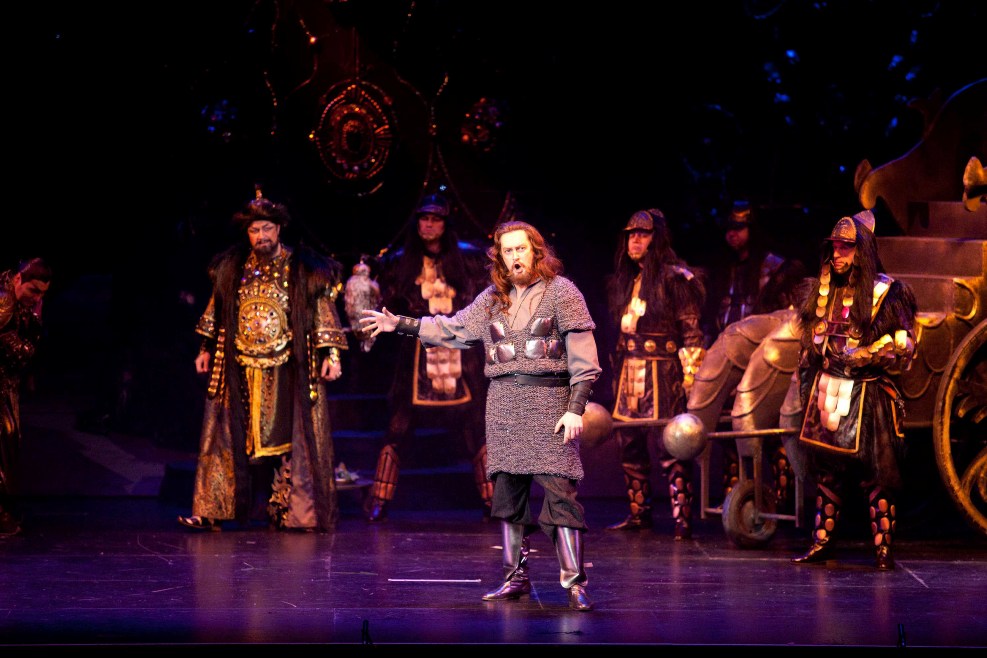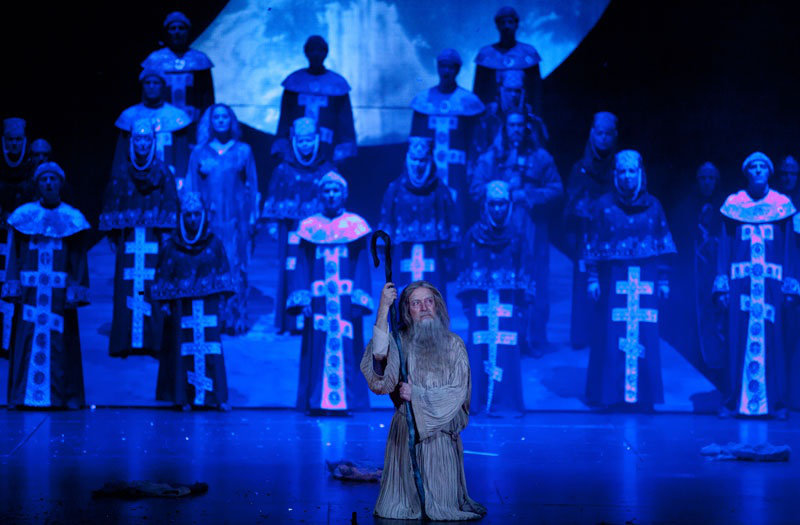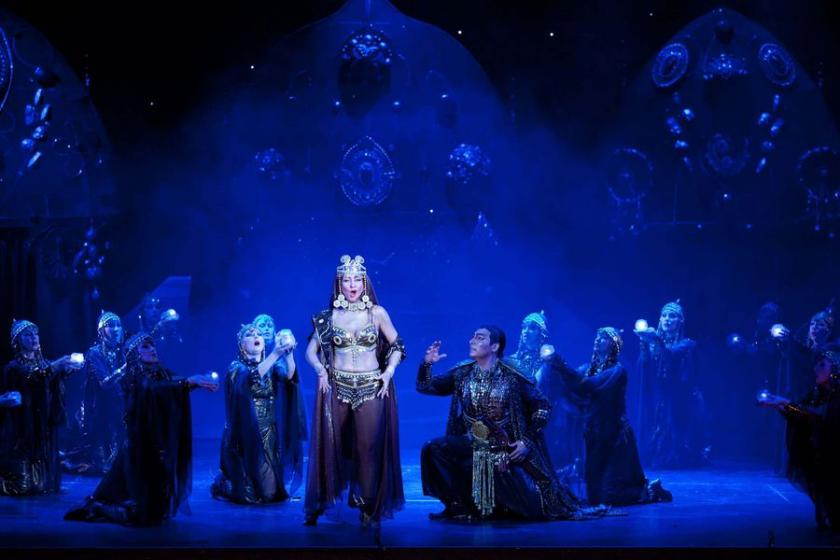Had this Moscow production any serious ideas in its head until its suddenly effective epilogue, much might have been pertinently said about an opera in which an imperialistic campaign ends in disaster, and where the Polovtsian “enemy” shows far more signs of a civilized life and wartime courtesy than the corrupt, crumbling court at home. Unfortunately veteran director Yuri Alexandrov’s very selective take on Borodin’s fitfully wondrous score asks for not a moment of dramatic truth from its principal singers: a great shame, because the voices are never less than stalwart, the chorus and orchestra under Jan Latham-Koenig’s mostly secure direction the kind of high Russian quality you might expect.
I don’t remember the Kolobov Novaya Opera Theatre of Moscow, to give its current full name, ever being as crass as this when I saw it in its ostentatious new theatre three years after its founding in 1997. Then there were high hopes for a production style which, if not as wifully radical as that of the very hit-and-miss Helikon company, could forge a strong alternative to Bolshoy tradition. Now it’s the Bolshoy which is welcoming in new directorial talent, albeit from abroad, while over at the Novaya Opera the spare, well-designed sets I remember from the 2000 Boris Godunov have been replaced by vulgar, tinselly awfulness in the one “exotic” act we get here, lacking even the charm of the painted flats in the old style. Stage and costume designer Vyacheslav Okunev has clearly been given too much new money to fling around.
The scenes in 12th century Putivl, Igor’s base in this anachronistic piece of nationalism with a twist, go well enough to begin with. Alexandrov postpones Glazunov’s marvellous work on the second-best Russian operatic overture after Glinka’s Ruslan and Lyudmila until after the Prologue (and then only gives us half of it). That makes us think we’re in for a journey along the Dnieper to the Polovtsian camp where Igor is quickly made a hospitably treated captive (Sergey Artamonov pictured below) – acts have previously been reversed in the Mariinsky version – but we stay in Putivl and, overture apart, have to wait for the big tunes until after the interval.

Warning signs soon creep in. The chorus are still up to the bad old sashaying, overacting tricks that bedevilled their Kirov counterparts 20 years ago; they sing well, but lack stage discipline. More worrying are the hunchback sisters busying themselves around Igor’s deserted wife Yaroslavna – first of much nonsensical (sorry, in this case nunsensical) movement business bedevilling every character who should be left alone. Much could have been made of corrupt Prince Galitsky (“Prince of Galich” here) and his drunken henchman lording it over defenceless women. But while an updated, Russian plutocrat debauchery might have been a latter-day cliché, here the stereotypes belong to the old school, everyone on stage having way too much of a good time to make any serious point about the roles of the sexes in a decadent patriarchal society.
Still, we’ve had stalwart singing from Sergey Artamonov’s legs-akimbo Igor and Evgeny Stavinsky’s not unattractive Galitsky – the only singer who shows any acting ability, albeit way over the top – and serviceable if typically squally-Russian-soprano work from Elena Popovskaya’s Yaroslavna (a sign of the company’s musical strengths is the double or triple casting; you may get better or worse if you go).
It all starts to fall risibly apart in Borodin’s gem, the uninterrupted sequence of pure inspiration in the Polovtsian camp – or is it the Polovtsian sex club in downtown Moscow? Why dress the Khan’s daughter Konchakovna (Agunda Kulaeva, another useful singer, stereotypical Russian mezzo this time) in the Russian equivalent of Ann Summers lingerie for large ladies? There’s no reason for her not to be an alluring but chaste eastern woman. When her would be lover Vladimir, Igor’s son, comes on, he seems to be addressing his love to two girly catamites, though it soon becomes clear that Kulaeva's butch, straddling dominatrix is the object of his desires. Tenor Aleksey Tatarintsev provides the most stylish singing of the evening, but is sabotaged by the ludicrous stage wrestling with his big beloved.
 But you ain’t seen nothing yet: the ensuing farrago would have been jettisoned even from ENO's ill-fated staging of the kitschy Borodin musical Kismet. I gaped in disbelief at the so-called “choreography” for the rightly celebrated Polovtsian Dances: writhing, bare-bellied ladies wheeled on in baths or rolled out from carpets, hand-waggling Al Jolson style instead of any leaps from the men as the music demands – Fokine would jeté from his grave in horror – and a general melée of unpretty figures in what I guess is supposed to be Igor’s nightmare. It was certainly mine, and the urge to boo – which I never have done and never will – had to be suppressed.
But you ain’t seen nothing yet: the ensuing farrago would have been jettisoned even from ENO's ill-fated staging of the kitschy Borodin musical Kismet. I gaped in disbelief at the so-called “choreography” for the rightly celebrated Polovtsian Dances: writhing, bare-bellied ladies wheeled on in baths or rolled out from carpets, hand-waggling Al Jolson style instead of any leaps from the men as the music demands – Fokine would jeté from his grave in horror – and a general melée of unpretty figures in what I guess is supposed to be Igor’s nightmare. It was certainly mine, and the urge to boo – which I never have done and never will – had to be suppressed.
Having cut the seven musical numbers Rimsky-Korsakov pieced together for Act Three, Alexandrov didn’t detain us long with the last act either. Yaroslavna’s lament was pierced last night by loud male hubbub behind the drop curtain. Then we got the duet with returning hubby, hair highlights for ageing added courtesy of the Polovtsian salon, and then no celebration, only the plangent a cappella lament about Russia’s devastation by the barbarian hordes: beautifully sung by a chorus at last completely still (pictured above).
Did Alexandrov have something to say after all? “We have forgotten to repent and acknowledge our mistakes,” which is what he writes in the programme, might even be a veiled hint at his country’s disastrous present course. But it was too late for that; the ultimate impression remains one of a musical world which can still field the strongest singers and players, but drowns their sterling virtues in a sea of bling, stand-and-deliver hokum and muddled messages.














Add comment